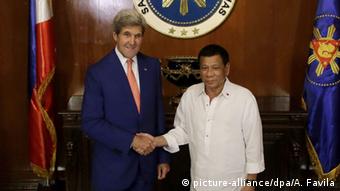
Some within the Japanese and U.S. media have said that they cannot get a read on new Philippine President Rodrigo Duterte’s foreign policy. Duterte, known for his singular personality, has in one breath hurled insults at the U.S. ambassador to the Philippines, going so far as to say that he would not care if the United States and his own government broke off relations, and in the next insisted that the U.S.-Philippine alliance stands firm, as the United States is the only nation to have signed a security treaty with the Philippines. And much like with the United States, Duterte has expressed that he would be “willing to develop a cooperative relationship on security with Japan,” but not long after added a qualifier that “China is not some second-rate figure.” Superficially, therefore, Duterte’s foreign policy may appear to be one of vacillation, obscuring his true intentions.*
However, the Philippines’ foreign policy is not as indecipherable as it may seem. Duterte’s foreign policy objectives are to pursue independence, sever the threads of foreign control, and place the country’s interests first and foremost.
In this respect, the illegitimate judgment passed down by the ad hoc South China Sea arbitration court has been a boon for the Philippines, acting as a catalyst that has touched off a re-evaluation of Philippine foreign policy within the country. The United States and Japan have always hoped that Duterte would side with them on the issue of the South China Sea. And yet, at the time of the Scarborough Shoal incident, those two nations did not substantively support the Philippines. At that time, former Philippine President Benigno Aquino III did as bid by the United States and created a standoff between his nation and China, one that affected economic cooperation between the two states to a large degree and led to crippling delays in the Philippines’ infrastructural projects. On this point, the meeting between former Philippine President Fidel Ramos and Madam Fu Ying, the Chinese deputy foreign minister, was a good start to healing the divide. Both sides were of the opinion that China and the Philippines share collective interests in ecological preservation of the ocean, cooperation within the fishing industry, clamping down on criminals, promoting cooperation in tourism and travel, and encouraging trade and investment.
The Philippines has had a long history of opposing external pressure and seeking independence in its foreign policy. After becoming a Spanish colony in 1565, the Philippines underwent a period of continued strife as its people resisted the colonial occupation for the three centuries following the initial Spanish invasion, with an average of five uprisings every year and over 102 larger rebellions. The Filipinos even established a Philippine Republic in 1899, which unfortunately lacked the power to prevent another period of U.S. colonization after a brief war with the Americans. Still, the struggle of the Philippine people against the United States did not stop, inflicting such a terrible cost that the United States was left with no choice but to grant the Philippines independence after World War II. This was ingrained into the genes of the Filipinos, forming the basis for their present efforts to resist and free themselves of U.S. interference in their foreign policy.
Of course, it will be quite difficult for the Philippines to realize complete independence and autonomy in that area. Domestically, there are those who take after Aquino III in advocating reliance on the United States and Japan to face off against China, as well as setting the results of the illegitimate South China Sea arbitration case as a precondition for bilateral talks. And externally, the alliance between the United States and the Philippines remains solid, with the United States exerting considerable influence over Philippine politics, as well as the island nation’s economy, military affairs, and culture.
Nevertheless, Duterte’s strength and pragmatism have made it possible for him to weaken the hold of the U.S. and Japanese governments on his country to a certain extent, something that hardly lacks precedent within the history of Philippine foreign affairs.
So when Duterte says that “China is not a second-rate figure,” the implied meaning is that his foreign policy does not account for any predetermined “central character,” and that his country is independent and autonomous, an attitude that will serve the Philippines well. Nothing will benefit it more than developing amicable relations with its neighbors — one and all.
The author is an associate professor at Sun Yat-sen University’s School of International Relations.
*Editor’s note: This quote, though accurately translated, could not be verified.

Leave a Reply
You must be logged in to post a comment.